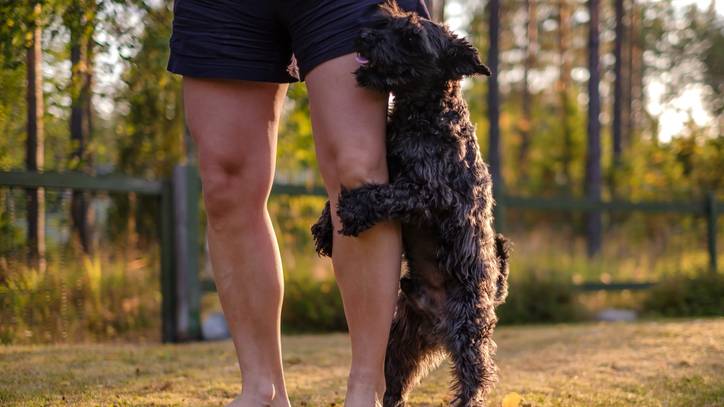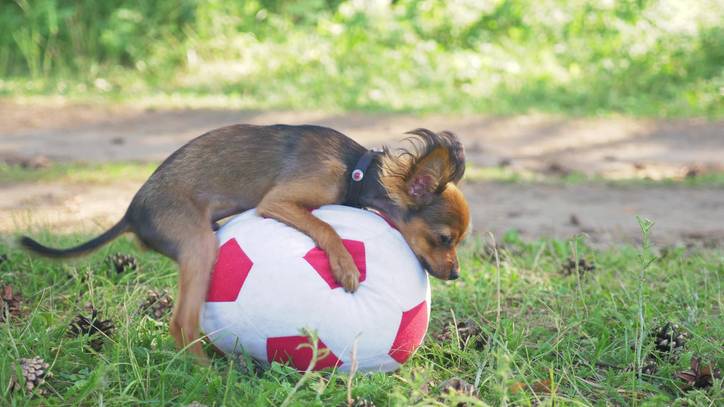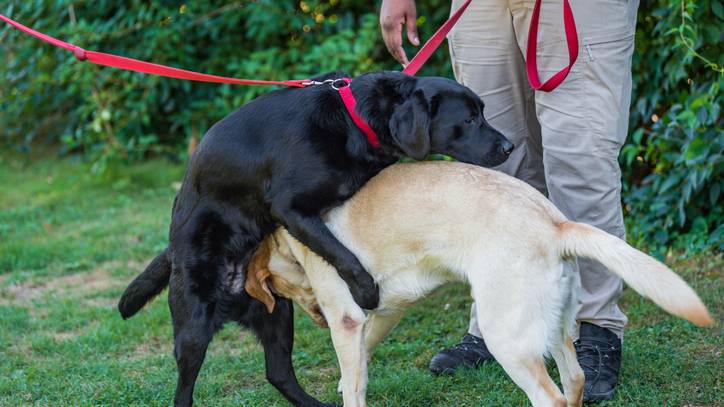Why do dogs hump? Is it normal behavior or should I stop it?
Does your dog think every day is hump day? Let’s dive into why some dogs hump incessantly and how to stop this behavior

Dogs hump for a variety of reasons, but you can be sure that whether they're mounting other dogs or your leg this action can be embarrassing and frustrating to deal with when it becomes excessive.
You may be relieved to know that humping, also referred to as mounting behavior, is actually a common and normal behavior exhibited by dogs.
By determining an underlying cause why your canine companion is mounting their favorite dog toy or human, however, you can prevent the behavior occurring in the first instance.
Let’s take a closer look at why dogs hump and what you can do to stop it.
Why do dogs hump?
Although many people believe that dogs display mounting behaviors for sexual or dominance purposes, there are actually several reasons that dogs hump.
These include:
Playing/Overstimulation
When dogs become overstimulated or “riled up” during playtime, they may mount you, another dog, or an inanimate object in order to release energy.
This type of humping is especially common in dogs who were not socialized appropriately as puppies and don’t know how to play well with other dogs.
Boredom
When dogs are not given enough physical and mental stimulation, they may become bored or frustrated and turn to humping behaviors to release pent-up energy or seek attention from their owners.
Stress/Anxiety
Stressed or anxious dogs may hump as a coping mechanism if they have learned that it feels good or that it will gain their owner’s attention. This may be due to their environment or certain situations (i.e., going to the dog park or the vet).
Sexual behavior
Humping of a sexual nature is most commonly displayed by young, sexually mature dogs who have not been spayed or neutered.
Some dogs may perform mounting behaviors to masturbate, even if they have been fixed, so spaying and neutering is not a guaranteed solution to humping.
Asserting dominance
Some dogs may hump other dogs to assert dominance, but according to the UC Davis School of Veterinary Medicine, this is rare.
Some dogs who hump to subdue others may also display signs of aggression, which should be dealt with by keeping them away from other dogs to prevent fighting and by seeking help from a dog trainer or veterinary behaviorist.
Medical issues
Lastly, certain medical problems can cause mounting behaviors in dogs. These include urinary tract infections, urinary incontinence (i.e., urinating inappropriately), and anything that can cause itchy skin, like skin allergies or fleas.
Some male dogs may also hump due to certain conditions of the prostate gland, priapism (a persistent erection), or paraphimosis (the inability of the penis to retract into its sheath). Your local veterinarian can help you determine if your dog is humping due to a medical condition rather than a behavioral issue.

What does it mean when a dog humps you?
As discussed in the previous section, dogs may hump humans if they are overexcited, bored, stressed, or aroused. Examining the situation in which a dog humps you can help you determine the underlying reason for their mounting.
For example, if a dog humps you after boisterous play, they are likely overstimulated. On the other hand, if a dog mounts you after being left alone all day, they may be understimulated and bored.
If their mounting is accompanied by signs of anxiety like whining, licking their lips, or changes in body posture, they are likely stressed. Lastly, if a dog humps you and has an erection, it may be sexually motivated.
Why does my neutered dog air hump?
Neutered dogs can hump for all of the reasons listed above. Generally, when they hump the air, this is an indication that they have pent-up energy and are humping as a means to release this energy.
If your dog air humps frequently, this may be a sign that they require more exercise or mental stimulation to focus this excess energy into.
Why does my female dog hump my male dog?
Like male dogs, female dogs may also display mounting behaviors and hump other dogs in the house. If you have a female dog that has not been spayed, they may hump unneutered males when they are in heat as a form of courtship. If no unneutered males are around, they may hump any other dog (male or female) out of sexual frustration.
That’s not to say that spayed females don’t hump their doggie housemates—female dogs may hump other dogs in the house during play, if they are bored or stressed, or to assert dominance over them.

How do I stop my dog from humping?
The best way to stop mounting behaviors in dogs is to prevent them in the first place. If the underlying cause of humping can be determined, it should be addressed as soon as possible to minimize the behavior.
For example, bored dogs who hump should be given enough physical and mental stimulation, and dogs should be treated for any underlying medical conditions that may cause mounting behaviors.
Training
Some steps can be taken to attempt to train your dog out of humping through redirection and positive reinforcement.
If you catch your dog mounting your leg, a guest, another pet, or a random object in your house, you can redirect them with a toy or a command (like sit) and then reward them with praise or a treat when they are no longer focused on humping.
If you can’t get your dog to stop humping, you can leave them in a “time-out” for a few minutes and then return and repeat the process until you achieve success. You should never yell or punish your dog in any way when your dog humps, as this may make the problem worse.
Training your dog as a puppy can increase the chances of your dog listening to you and remaining calm once they grow up.
Seek help from trainer or a behaviorist
Some cases of mounting may require help from a dog trainer or certified veterinary behaviorist. Dogs who hump due to anxiety may benefit from medications in addition to behavior modification, although this is typically reserved for severe cases.
Schedule an appointment with your vet
If you are having difficulty getting your dog’s humping under control, schedule an appointment with your veterinarian to discuss what steps can be taken to resolve this issue.
PetsRadar Newsletter
Get the best advice, tips and top tech for your beloved Pets
Dr. Diana Hasler graduated with distinction from the University of Edinburgh Royal (Dick) School of Veterinary Studies in 2018. She has experience working as a small animal veterinarian in general practice, where she has treated many dogs, cats, rabbits, and rodents. She has also recently branched out into the field of medical communications, doing freelance work as a medical editor and writer. Dr. Hasler currently lives in Edinburgh where she enjoys spending time with her husband Gavin and playing with their feisty tabby cat Poppy.

